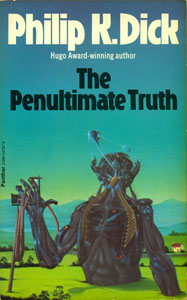For “The Penultimate Truth” (1964), Philip K. Dick pieces together some of the greatest hits among his short stories into a grand statement about governments lying to their citizens. PKD draws from “The Defenders” (1953), wherein the government tells citizens in belowground tanks that the war is still going on when in fact it is not.
Surrounded by Yance-men
He draws from “The Mold of Yancy” (1955), in which speechwriters prop up the president, giving people what they want to hear, in a precisely formulated tone. Also, the murderous suspect-framing device from “The Unreconstructed M” (1957) returns, as does the time-scoop that features in several stories.
Even if you’ve read these stories shortly before reading “The Penultimate Truth,” it won’t feel redundant. In fact, your familiarity might help you navigate this layered yarn. PKD puts these old elements together in a fresh novel that plays out at first like a mystery, and then becomes a grand intersection of power plays.

“The Penultimate Truth” (1964)
Author: Philip K. Dick
Genre: Science fiction
Setting: Earth, amid World War III
In this future, everything is to some degree a lie. The job of the Yance-men is to write speeches for Talbot Yancy (actually a simulacrum) that will appease the “tankers” who live belowground.
The full truth is never used in these speeches, although there are kernels of truth: A war between the leadies (robots) of West-Dem (the USA, etc.) and Pac-Peop (the USSR, etc.) really was fought, but it ended 13 years ago. There are health threats above ground, but the radiation is in defined areas; most of the Earth is beautiful forestland.
Keeping citizens literally belowground as robot-building slave labor for the government employees above is a direct critique of the way world governments operated in PKD’s time and still today. But the book is not as funny as some PKD satires and also not as starkly terrifying as “1984,” “Brave New World” or “The Time Machine.” One of the annoyances of tank life, for instance, is sharing a bathroom.
Shades of ‘1984’
Setting aside the difference in tones, “1984” is the closest precursor to “The Penultimate Truth” because both are about rewriting history. Intriguingly, PKD imagines that West-Dem and Pac-Peop receive different versions of what happened in World Wars I and II, such that people of both halves of the world believe their side won.
The author sets up a world where governments have monopolies on the transmission of information of any kind. While this is definitely something you just have to go with to accept the novel’s world-building, it is fascinating to think about how quickly people might accept big lies if there weren’t competing and sometimes antagonistic media like we have in the real world.
In rather sober fashion, PKD extrapolates the way the future will be: The governments don’t rule by threats and fear (after all, that will eventually lead to revolution), but rather by lies. Climbing the power structure requires lies within the world of lies; may the best liar win.

All of these power players are wonderfully drawn. The current most powerful man in the world is Brose, whose brain is his only remaining major organ that isn’t artificial. An even more ingenious invention is Brose’s top challenger, Lantano, whose appearance oscillates because he has traveled through time so much. Sometimes he appears young, sometimes middle-aged, sometimes old.
Also in play is Runciter, who provides nice con-apts – complete with ping-pong tables and swimming pools – for escaped tankers; and Foote, who leads an independent worldwide police/detective agency, and who is somewhat precognitive. (A minor quibble about “The Penultimate Truth”: PKD shovels so many ideas into it. Foote doesn’t need to be a precog for story purposes; it’s enough that he’s good at his job.)
Two audience surrogates
The two audience surrogates are Joe Adams, a Yance-man who is lonely from living with leadies and seeing only nature (rather than other people) around him; and Nicholas St. James, who climbs out of a California tank and learns the truth about the state of the world.
When everyone aboveground uses lies to get a slice of power, things can get convoluted. Most entertainingly, Brose apparently frames himself for a murder so that Foote will believe Brose couldn’t possibly have done it, and therefore will turn his attention elsewhere. But Lantano actually frames Brose of framing himself.
As the power plays reach a conclusion, Adams reflects on the options for who will lead Earth (not that people get to vote; it’s more of a theoretical exercise for Adams). There’s Brose, who is obviously evil, and Lantano, who is less evil but who kills innocent people in order to knock out the more evil Brose.
A third option might be Runciter (who we learn a lot about, but who doesn’t actually appear in the novel), since he is building these con-apts for ex-tankers. The economics of this isn’t totally explained, but Runciter seems to be a real-estate magnate who – like everyone aboveground — is living large off the slave labor below. So even with Runciter we’re talking about someone who makes the system work for him.
After the mystery of “What’s aboveground?” is solved by Nicholas, the book’s biggest mystery emerges: What will happen when the tankers learn they’ve been lied to, and that they’ve been living in holes and providing slave labor for the ruling class? Civil war seems like a safe guess.
Can we handle the truth?
But the answer PKD gives us is less straightforward and arguably more chilling: We won’t ever know what will happen when the tankers learn the truth, because they won’t ever learn the truth.
The Yance-men are too good at their speech-writing and info-spinning jobs. And even those with a conscience, such as our de facto hero Adams, want to avoid a civil war. They would like to see a smooth transition of the tankers back to the Earth’s surface. In order to keep the tankers from getting too angry, that means more lies, so it’s back to the typewriter for Adams.
A reader is left with the feeling that Adams and his fellow Yance-men will pull it off. In this book, PKD chronicles specific lies and the lie-constructing apparatus, but it’s also a snapshot of how the citizenry has been conditioned. Governments lying to their citizens is the definition of politics; people don’t expect anything different, and they don’t get worked up over something that’s around them all the time.
The world of “The Penultimate Truth” isn’t nearly as unappealing as that of “1984,” but it’s arguably harder to take because PKD gets it so precisely right.

